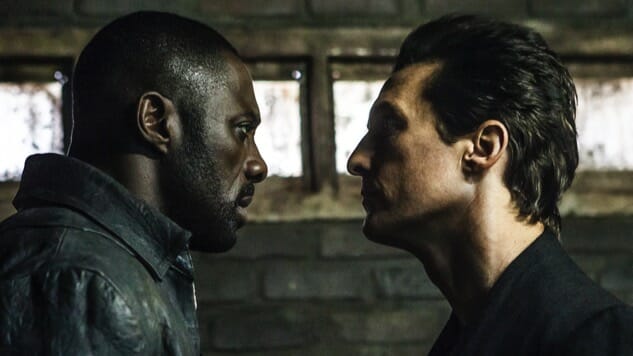Will The Dark Tower Break Mike Flanagan?
To horror's golden childe the rights to King's inscrutable magnum opus came.
Photo Courtesy of Sony
But he grew old—
This knight so bold—
And o’er his heart a shadow—
Fell as he found
No spot of ground
That looked like Eldorado.
Word has been passed down from on high: Mike Flanagan, whose directorial career on Netflix has been a string of hits (The Midnight Club, The Haunting of Hill House, the best-horror-TV-shows-of-all-time contender Midnight Mass), has acquired the rights to produce a TV and film series based on Stephen King’s series of epic novels, The Dark Tower. It has set the internet and entertainment news on fire. It’s a match made in whatever heaven would be in King’s macabre universe.
But can he succeed?
I am someone who first read King’s novel The Gunslinger in a beaten old paperback edition when it was still more a collection of short stories threaded together than what it now is: The first of a seven-part epic which he has, infuriatingly, rewritten to lean into the weirdness that emerged organically in the later entries. Those of us who came to the series before it was finished and then had to wait a couple decades for King to bring it home understand that to love The Dark Tower is to regard a thing that, like the eponymous lynchpin of creation at the narrative’s center, cannot be seen in its totality from just one viewpoint. To get the true experience, you need to read two fully different versions of the starting trilogy of books in a series that now encapsulates eight books and a short story, with its tendrils spread throughout nearly all of King’s entire body of work. There are oblique connections from this series to It and Salem’s Lot and The Stand, and even to King’s collaborative duology with Peter Straub, The Talisman and Black House.
Any fan of The Dark Tower would love to see it adapted. To briefly fail to explain the story: All of creation is at risk because a force of evil (that King originally didn’t name until the third or fourth book) called the Crimson King is trying to destroy the Dark Tower, a focal point for the energies that buttress the world (or something). The errant gunslinger Roland, scion of a fallen kingdom, must stop him. The books follow him as he plods ruthlessly through a post-apocalyptic wilderness and collects a group of comrades from our world to help him in his fight. It’s inspired by the Italian Westerns that made Clint Eastwood an international star, by Robert Browning’s poem “Childe Roland to the Dark Tower Came” and, while I don’t think King has ever said so, there are some pretty striking similarities in subject matter to Alejandro Jodorowski’s El Topo. All of it is in service to a story where, much of the time, the right and proper thing is for the heroes to pull out six-guns and gun down robots, demons, and vampires with righteous fury.
Yet The Dark Tower has stubbornly resisted successful adaptation. The saga of the little-celebrated 2017 film starring Idris Elba and Matthew McConaughey was a very long one: At various points in the decade prior to its release, J.J. Abrams and Ron Howard were attached to direct, and neither headed up the final project. Howard laid out a pretty ambitious slate of features that was to span film and TV, which Flanagan also seems to be promising: Reports indicate he got the sale from King by proposing a number of seasons of television followed by a couple feature-length films.
-

-

-

-

-

-

-

-

-

-

-

-

-

-

-

-

-

-

-

-

-

-

-

-

-

-

-

-

-

-

-

-

-

-

-

-

-

-

-

-








































